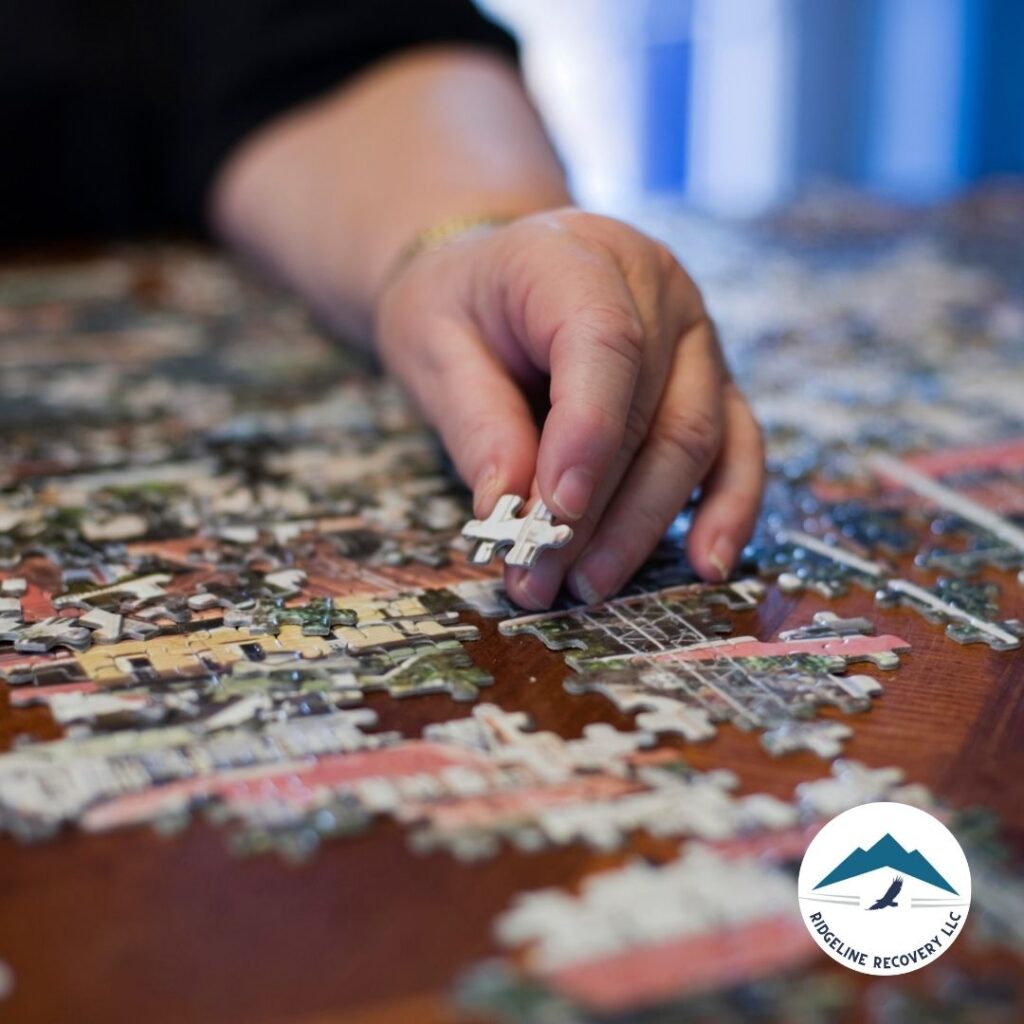Struggling with Addiction in Columbus? Here’s What You Need to Know.
Let’s be real: addiction is a thief. It steals your time, your energy, your money—and it holds your life hostage.
When you’re stuck in that cycle of addiction, every day can feel like the same grind, and you can find yourself asking:
“Is recovery even possible?”
“Where can I find addiction therapy near me that actually works?”
“How can I make sure this time it sticks?”
If you’re in Columbus and struggling, Ridgeline Recovery LLC has designed personalized programs that meet you where you’re at and get you on the path to long-term sobriety. No gimmicks, no quick fixes, just strategies that have proven effective, time and time again.
In this guide, we’re not here to just scratch the surface. We’re going all in—covering everything from finding addiction recovery in Columbus, to what you can expect from personalized programs, to the role of mental health and holistic therapies.
Why Long-Term Recovery is More Than Just “Quitting”
Most people think recovery is all about quitting your addiction. But true recovery is about transforming your life—your routines, your thoughts, your actions.
It’s about replacing negative habits with ones that bring you closer to who you want to be.
And that’s where a personalized recovery program comes in. Ridgeline Recovery LLC offers addiction recovery Columbus services that aren’t one-size-fits-all. They’re designed to support you, specifically, because each person’s experience with addiction is unique.
Let’s look at some of the core elements that make personalized recovery programs work.
Why Personalized Programs Matter in Addiction Recovery
- Everyone’s “Why” Is Different
Some people start drinking or using drugs to escape, others because of social pressures, some due to pain—both physical and emotional.
A personalized program finds your “why” and attacks it head-on with targeted strategies. - The Right Tools for You
If you’ve ever looked up “addiction treatment near me” or “addiction recovery near me,” you know there are tons of options out there. But not every treatment is right for everyone.
Some need medication like Vivitrol, some need one-on-one counseling, and some thrive in group therapy. Personalized treatment plans make sure you’re not wasting time on tools that don’t work for you. - Better Long-Term Success Rates
Studies show that when people receive customized care, they’re more likely to succeed.
So if you’re ready to commit, go for a program that’s committed to you.
Components of a Comprehensive Addiction Recovery Program in Columbus
Ridgeline Recovery’s addiction treatment Columbus plans cover all aspects of addiction, providing you with tools that support long-term sobriety. Here’s what a thorough recovery program should look like.
1. Medical Detox (When Necessary)
Some substances—like alcohol, opioids, and benzodiazepines—can be dangerous to quit cold turkey.
That’s why many recovery programs start with a safe, medically-supervised detox.
Detox can be tough, but it’s a critical first step. If you’re looking up “inpatient drug rehab centers near me,” you’re probably aware that detox is often part of that process.
2. Individual Counseling and Therapy
The foundation of long-term sobriety is the inner work you do in therapy.
Counselors at Ridgeline Recovery help you understand the root causes of addiction—like trauma, mental health challenges, or behavioral patterns that have held you back.
In therapy, you work through those causes and build mental resilience so that your sobriety can stand up to future challenges.
3. Medication-Assisted Treatment (MAT)
Medications like Vivitrol can make a world of difference, particularly if you’ve struggled with staying sober in the past.
Vivitrol blocks the effects of opioids, making it easier to avoid relapse. If you’re looking for a “Vivitrol clinic near me,” Ridgeline Recovery has you covered.
MAT isn’t for everyone, but for some, it can be a real game-changer.
4. Mental Health Services
Addiction and mental health issues often go hand in hand. Anxiety, depression, PTSD—these conditions can fuel addiction and make recovery that much harder.
At Ridgeline Recovery, mental health therapists near you can provide treatment for both addiction and any underlying mental health issues. Think of this as a two-pronged approach:
Tackle addiction AND mental health for stronger, longer-lasting recovery.
5. Group Therapy and Support Groups
Sometimes, the best people to talk to are the ones who get it.
Group therapy lets you share experiences, pick up tips, and gain strength from others on the same path. Programs like NA steps (Narcotics Anonymous) can also provide invaluable support.
And no, you don’t have to “do it alone” to be strong. Recovery is better when it’s shared.
6. Family Counseling
Addiction impacts everyone close to you, so recovery has to include them too.
Family counseling sessions at Ridgeline Recovery help loved ones understand addiction, support you better, and rebuild the trust that may have been damaged.
The Role of Holistic Therapies in Addiction Recovery Columbus
Holistic therapies recognize that healing goes beyond the body and mind. It’s about aligning everything—your physical health, mental stability, and emotional well-being.
Some of the holistic therapies you might find at Ridgeline Recovery include:
- Yoga and Meditation – Great for building mental focus, emotional regulation, and physical strength.
- Art Therapy – Express feelings you might not even realize are there.
- Nutrition Counseling – Addiction can wreak havoc on your body; a good diet helps restore physical health.
- Exercise and Physical Activity – Boosts mood, reduces cravings, and builds confidence.
When you’re able to treat all aspects of yourself, you’re more likely to sustain recovery. Holistic therapies give you more tools in the toolkit.
Common Questions about Addiction Recovery
How Long Does a Substance Abuse Program Take?
It varies. Detox might be a few days to a couple of weeks, while inpatient treatment often lasts between 30-90 days. Long-term rehab programs can be 6 months or longer. Ridgeline Recovery offers long-term drug rehabilitation for those who need extended support.

What’s the Difference Between Inpatient and Outpatient?
Inpatient rehab means you live at the facility, while outpatient rehab allows you to live at home and come in for scheduled treatments.
Some people benefit from inpatient addiction rehab near me if they need a controlled environment to avoid triggers.
Is Medication Like Vivitrol Necessary?
Not always. But for those who struggle with opioid cravings or relapse, Vivitrol can be incredibly effective. If you’re looking for a Vivitrol clinic near me, Ridgeline can connect you to the right resources.
Can Mental Health Issues Be Addressed Alongside Addiction?
Yes, and they should be. Mental health problems often underlie addiction, so it’s crucial to treat both. If you’re seeking mental health services near me or a mental health therapist near me, Ridgeline provides comprehensive services to support you fully.
What Sets Ridgeline Recovery Apart?
When you’re trying to get sober, finding the right program can make all the difference. Here’s what makes Ridgeline’s addiction recovery Columbus programs unique:
- Personalization: They don’t just follow a script; they create a roadmap based on your needs.
- Mental Health Integration: With a range of mental health therapists and services available, they tackle all aspects of recovery.
- Holistic Support: Nutrition, fitness, meditation—these are all part of the package.
- Long-Term Focus: They’re not just focused on getting you clean but on keeping you clean.
What Makes Someone an Alcoholic?
Let’s dispel some myths. You don’t have to be drinking 24/7 to have a problem.
Signs of alcoholism can be subtle. If you find that you’re relying on alcohol to relax, or if you can’t stop drinking once you start, these might be signs of alcoholism.
Long-Term Effects of Alcohol
Alcohol might seem like it’s helping in the short term, but it has devastating long-term effects.
From liver disease to brain damage, to something called alcoholic dementia, alcohol abuse can alter the rest of your life.
Moving Forward: The First Step Is The Hardest, But You Don’t Have To Take It Alone.
Let’s be honest: if getting clean was easy, everyone would be sober. But it isn’t easy. And that’s why getting help—the right kind of help—can make all the difference.
Ridgeline Recovery LLC’s addiction recovery Columbus programs are designed to provide that help. Whether you’re dealing with drugs, alcohol, or mental health challenges, they offer the tools you need for real, lasting change.
Long-Term Addiction Recovery Columbus: Staying Sober Beyond the Initial Treatment
Recovery Isn’t Just a Destination—It’s a Daily Practice
When you think of addiction recovery, the first goal that comes to mind is often sobriety. But true, lasting recovery is so much more. It’s about setting yourself up for a life where sobriety is sustainable—where each day, you build on the progress you’ve already made.
Ridgeline Recovery’s addiction recovery Columbus programs are designed with the future in mind. This is why it’s not just about getting clean but about staying clean and living fully.
Let’s dive deeper into what it takes to build a sustainable life in recovery and explore tools, therapies, and support systems available in Columbus that can help you stay on track.
The Essential Role of Aftercare in Addiction Recovery Columbus
1. What Is Aftercare, and Why Is It Crucial?
Aftercare is the continuation of support that begins once the primary addiction treatment is complete.
Think of it as a safety net. Without aftercare, many people find themselves vulnerable to relapse. It’s estimated that nearly half of people in early recovery will experience some form of relapse, which is why a structured aftercare plan is non-negotiable.
Ridgeline Recovery’s addiction treatment Columbus services include customized aftercare options that cover the essential components of post-treatment life. Aftercare isn’t a one-size-fits-all approach; it’s a toolkit of resources that keeps you grounded and connected, even when life gets tough.
2. Types of Aftercare Services
Aftercare services are available in various formats to match the unique needs of each individual. Ridgeline Recovery offers:
- Outpatient Counseling: A flexible option for those who have completed inpatient treatment but still need regular support.
- Support Groups: Finding a local 12-step program near me or joining non-12-step support groups can give you a network of people who understand your journey.
- Mental Health Services: Ongoing access to a mental health therapist near me is crucial, especially if you’re dealing with co-occurring disorders like anxiety, depression, or PTSD.
- Sober Living Arrangements: Facilities like sober houses provide a structured, substance-free environment that supports gradual reintegration into daily life.
3. The Benefits of Sober Living Houses
Sober living houses, also known as halfway houses, are environments designed to ease the transition from intensive treatment back into society. These houses provide:
- Accountability: Structured routines and house rules keep residents accountable to their goals.
- Supportive Community: Living with others in recovery reduces isolation and fosters a sense of belonging.
- Safety: Removing yourself from high-risk situations in early recovery minimizes the likelihood of relapse.
If you’re researching “what is a sober house” or “who pays for a halfway house,” you’re likely looking for a solution that fits your recovery needs. Ridgeline Recovery works to ensure that individuals in addiction recovery Columbus have access to these critical resources.
The Intersection of Mental Health and Addiction Recovery
Why Treating Mental Health Is Essential for Lasting Recovery
Dual-diagnosis (the coexistence of mental health issues and addiction) isn’t uncommon. Conditions like depression, anxiety, bipolar disorder, and PTSD can worsen addiction.
The unfortunate reality is that untreated mental health issues are one of the top reasons for relapse. A person who struggles with anxiety or PTSD, for instance, may turn to substances to manage symptoms, creating a vicious cycle.
Mental health services near me are not just about helping with mental stability—they’re part of the foundation for long-term sobriety. Ridgeline Recovery LLC offers mental health therapists and comprehensive mental health services that work alongside addiction treatment to support holistic recovery.
Medications in Addiction Recovery: Vivitrol, Naltrexone, and MAT
What is Medication-Assisted Treatment (MAT)?
Medication-Assisted Treatment (MAT) is a therapeutic approach that uses medications alongside counseling and behavioral therapies to treat substance use disorders. In MAT, medications like Vivitrol, naltrexone, and buprenorphine are used to reduce cravings and ease withdrawal symptoms.
1. How Vivitrol Supports Sobriety
Vivitrol, a monthly injectable form of naltrexone, is one of the most widely used medications in MAT. Vivitrol blocks opioid receptors in the brain, which significantly reduces cravings and prevents the user from feeling the euphoric effects of opioids.
If you’ve been searching for a Vivitrol clinic near me, Ridgeline Recovery offers MAT services to support you every step of the way. Vivitrol is particularly effective for those who have struggled with relapse, as it provides an added layer of protection against cravings.
2. How to Know if MAT Is Right for You
MAT isn’t the best fit for everyone, but it can be life-changing for those with severe substance use disorders. Here’s who might benefit most from MAT:
- Individuals with high relapse rates: MAT can provide stability for those who’ve experienced frequent relapses.
- People with opioid or alcohol use disorder: MAT is especially effective for opioid and alcohol dependence.
If you’re interested in exploring this option, talk to the professionals at Ridgeline Recovery to see if MAT can help with your addiction recovery Columbus journey.
Relapse Prevention Strategies: Building Resilience in Recovery
Relapse prevention is more than just avoiding old habits—it’s about developing skills, routines, and mindsets that support sobriety.
1. Identifying Triggers
Knowing your triggers is key. Triggers can be:
- Environmental: Certain places, people, or activities can bring back old habits.
- Emotional: Stress, anger, or loneliness can lead to cravings.
- Physical: Fatigue or illness can make it harder to maintain sobriety.
When you identify these, you can plan strategies to avoid or cope with them.
2. Building a Daily Routine
A daily routine provides stability and a sense of purpose. Simple routines, like a morning exercise or mindfulness practice, can help you avoid old habits and focus on new goals.
Holistic therapies such as meditation, yoga, or physical activity can be transformative. Many people find that regular physical activity reduces stress, improves sleep, and boosts mood—creating a natural buffer against cravings.
Exploring Different Types of Addiction Therapy in Columbus
Types of Addiction Therapy Services
Ridgeline Recovery’s addiction therapy services in Columbus include a variety of evidence-based methods, each chosen for its ability to support long-term recovery.
1. Cognitive Behavioral Therapy (CBT)
CBT focuses on identifying and changing thought patterns that contribute to addictive behaviors. It’s like rewiring your brain to think in ways that serve you, rather than sabotage you.
2. Dialectical Behavior Therapy (DBT)
DBT is an extension of CBT that adds mindfulness. It’s especially useful for managing intense emotions, which can be a major factor in addiction relapse.
3. Motivational Interviewing (MI)
Motivational Interviewing is a counseling technique that helps individuals find their own motivation to change. If you’re struggling with motivation, MI might be a great fit.
4. Family Therapy
Family Therapy focuses on repairing relationships affected by addiction. It’s not just about getting you sober—it’s about healing the whole family unit.
FAQs about Addiction Recovery in Columbus
Q1: How Long Does It Take to Fully Recover from Addiction?
Recovery is ongoing. While detox may last a few days, treatment can range from 30 to 90 days. Long-term programs, such as those offered at long-term drug treatment centers, are designed to support people for 6 months or longer.
Q2: What Is the Role of a Mental Health Clinic in Recovery?
Mental health clinics provide crucial support for those with co-occurring mental health and addiction issues. If you’re searching for a mental health clinic near me, Ridgeline Recovery’s integrated services can help.
Q3: What’s the Best Way to Detox from Drugs Like Cocaine?
Detoxing from substances like cocaine should be done under medical supervision. Searching “how to detox cocaine” online can provide general tips, but only a professional detox program ensures safety.
Choosing the Right Addiction Recovery Columbus Program
Choosing the right recovery program isn’t just about finding the closest one; it’s about finding the one that meets your needs.
Key Qualities to Look for in a Recovery Program
1. Comprehensive Services
The best recovery programs include medical, therapeutic, and mental health support. Programs that only focus on detox may be insufficient for long-term recovery.
2. Holistic Approach
From drug alcohol rehabilitation to meditation, holistic programs recognize that addiction affects every part of you. Ridgeline Recovery’s addiction recovery Columbus program integrates therapies for physical, mental, and emotional health.
3. Proven Success Rates
Look for programs that demonstrate a strong track record in long-term success. This isn’t about quick fixes—it’s about lasting transformation.
Building a Lasting Foundation for Recovery: Programs and Practices for Ongoing Sobriety in Columbus
Understanding the Journey of Lifelong Recovery
Recovering from addiction isn’t a one-time event. It’s a long-term journey that requires a consistent, personalized approach to treatment, care, and support. A successful addiction recovery Columbus program does more than guide you through initial sobriety; it gives you the tools and resources to manage sobriety day in and day out.
Below, we dive into some effective strategies and options available in Columbus that can serve as pillars in your recovery journey. From holistic therapies to specialized mental health resources, building a multi-layered support system is essential for navigating both the early stages and the long haul of recovery.
Importance of Personalized Therapy in Addiction Recovery Columbus
1. Customized Therapy Approaches for Effective Recovery
Every individual’s recovery needs are unique. What works for one person might not work for another, which is why personalized addiction therapy is essential. With addiction therapy near me options in Columbus, individuals can access tailored programs designed to meet their specific needs.
Some of the top therapy types in personalized treatment include:
- Cognitive Behavioral Therapy (CBT): This approach focuses on changing negative thinking and behavior patterns, giving you the tools to avoid high-risk situations.
- Dialectical Behavior Therapy (DBT): By enhancing emotional regulation and mindfulness, DBT is particularly effective for individuals with co-occurring mental health conditions.
- Motivational Interviewing (MI): This type of therapy builds on the client’s own motivations for staying sober, helping to strengthen their commitment to recovery.
2. The Role of Family Therapy in Long-Term Sobriety
Addiction impacts everyone around you, especially close family members. Family therapy brings loved ones into the recovery process, helping them understand the challenges of addiction and giving everyone the tools to support one another effectively. Addiction therapy services that include family therapy can help repair relationships, rebuild trust, and create a healthier home environment—one of the most critical elements for maintaining sobriety.
Exploring Long-Term Treatment Options for Sustainable Recovery
What Are Long-Term Rehab Programs, and Why Are They Effective?
Long-term rehab programs are designed to provide extended support beyond typical 30- or 60-day programs. These can include inpatient drug rehab centers near me, long-term substance abuse treatment facilities, and long-term drug rehabilitation programs, all of which focus on consistent, structured treatment. These programs allow individuals to:
- Develop deeper coping strategies.
- Address underlying mental health issues with dedicated support.
- Focus on comprehensive skill-building for managing daily challenges.
For those seeking addiction treatment Columbus Ohio that prioritizes ongoing support, long-term programs are one of the best options.
Holistic Therapy and Wellness in Addiction Recovery Columbus

The Benefits of Holistic Therapies for Recovery
Holistic therapies are becoming increasingly popular as complementary options in addiction recovery programs. Holistic treatments support the whole individual—mind, body, and spirit—and often include practices like:
- Yoga and Meditation: These help to reduce stress, improve mindfulness, and encourage healthy coping mechanisms.
- Art and Music Therapy: Creative therapies are known to promote emotional release, healing, and self-expression, which are essential in overcoming addiction.
- Nutritional Therapy: Diet plays a critical role in recovery, as poor nutrition can often contribute to emotional imbalances and cravings.
Addiction treatment Columbus programs that incorporate holistic approaches help people manage triggers and improve overall well-being, which is key for a successful recovery.
Medication-Assisted Treatment (MAT): A Powerful Tool for Relapse Prevention
How Medication-Assisted Treatment Supports Long-Term Sobriety
Medication-Assisted Treatment, or MAT, is a cornerstone of many addiction recovery programs. MAT can help reduce cravings and withdrawal symptoms, which are two of the primary causes of relapse. For those in Columbus looking to integrate MAT into their treatment plan, Vivitrol clinics near me offer MAT services using Vivitrol and other medications that support opioid and alcohol addiction recovery.
Here’s a breakdown of some commonly used MAT medications:
- Naltrexone (Vivitrol): This medication is especially effective in reducing cravings for opioids and alcohol.
- Buprenorphine: Known for its ability to alleviate withdrawal symptoms, buprenorphine is often used in conjunction with counseling.
- Methadone: Another option for opioid addiction, methadone helps reduce cravings and allows for a smoother transition into long-term sobriety.
MAT isn’t a standalone solution, though. It works best when paired with counseling, therapy, and a structured aftercare plan.
The Role of Mental Health Services in Addiction Recovery Columbus
1. Dual-Diagnosis Treatment for Co-Occurring Disorders
Substance abuse often goes hand-in-hand with mental health challenges like depression, anxiety, or PTSD. Mental health services near me in Columbus, offered alongside addiction treatment, allow individuals to address both their mental health and addiction. This dual-diagnosis approach is vital, as untreated mental health issues can lead to relapse.
Types of Mental Health Support in Dual-Diagnosis Treatment:
- Individual Counseling with a Mental Health Therapist: Working with a therapist helps address trauma, manage stress, and develop coping mechanisms.
- Inpatient and Outpatient Options: Depending on the severity of the mental health condition, individuals can choose from inpatient mental health hospitals near me or outpatient counseling services.
- Medication for Mental Health: In some cases, medications can help manage symptoms of mental health disorders, making it easier to stay sober and focused on recovery.
2. Finding Local Resources: Mental Health Clinics and Support Networks
Local resources like mental health clinics near me offer accessible support, providing essential counseling, assessments, and therapy services for those in recovery. Staying connected with mental health professionals throughout recovery strengthens resilience against relapse.
Relapse Prevention Strategies: How to Stay Grounded in Recovery
Building a Daily Routine That Supports Sobriety
One of the best tools for preventing relapse is establishing a healthy, structured daily routine. This can include:
- Morning Mindfulness Practices: Starting the day with meditation or a quick journal entry can set a positive tone.
- Physical Exercise: Exercise reduces stress, releases endorphins, and promotes mental clarity, all of which are beneficial for recovery.
- Regular Therapy or Group Meetings: Attending weekly therapy sessions or group meetings keeps you connected to your goals and provides accountability.
Creating a routine gives structure to your day, which can be an invaluable asset in addiction recovery.
Support Systems: Building a Sober Network in Columbus
1. The Value of Peer Support
Surrounding yourself with people who understand the challenges of recovery can be incredibly motivating. Many individuals find that peer support groups like NA steps meetings or local 12-step programs near me provide community and understanding that is essential for ongoing sobriety.
Benefits of Peer Support:
- Accountability: Knowing others are there to support and encourage you keeps you accountable.
- Empathy: Peers in recovery understand the struggles you face, often providing insights that family members or friends may not have.
- Connection: Reducing isolation through peer support is crucial, as loneliness can be a trigger for relapse.
2. Finding a Sober Living Community
For some individuals, returning to their previous living environment after treatment can be challenging. Sober living communities provide a structured, supportive environment where individuals can gradually reintegrate into everyday life. What is a sober living house? Sober living houses offer stability, accountability, and a substance-free space where recovery can flourish.
Nutrition and Lifestyle in Addiction Recovery Columbus
How Nutrition Impacts Recovery and Mental Health
Poor nutrition is often associated with addiction, as individuals in active addiction may neglect their physical health. During recovery, a balanced diet supports both mental and physical well-being. Nutritional therapy, as part of a holistic therapy approach, can improve mood stability, energy levels, and overall resilience.
Key Nutritional Goals in Recovery:
- Increase Protein Intake: Protein supports neurotransmitter production, which helps stabilize mood.
- Hydrate Regularly: Staying hydrated reduces fatigue and helps manage cravings.
- Focus on Nutrient-Dense Foods: Vitamins and minerals support brain function and can combat deficiencies caused by substance use.
Integrating nutrition counseling into your recovery plan is a practical step toward holistic healing.
Rediscovering Yourself in Recovery: Living a Sober Life Full of Purpose
Recovery isn’t just about stopping something; it’s about starting something new. Rediscovering passions, setting goals, and forming healthy habits all add up to a life that’s fulfilling without substances.
Final Word: Your Path to Recovery Starts Here
The decision to seek help is powerful. It’s the catalyst of recovery.
The road ahead isn’t easy, but with the right program, the right people, and the right mindset, it’s more than possible—it’s probable.
Call Us Now!
If you or a loved one is struggling with heroin or alcohol dependency, reach out to Ridgeline Recovery Center in Columbus, Ohio, today. At Ridgeline Recovery, we offer a path to hope and healing. Our comprehensive Addiction Recovery services include Addiction Therapy, Addiction Treatment, Vivitrol Clinic and specialized Mental Health Services designed to support your journey to recovery.
We provide Aftercare Programs and Peer Support to ensure you have ongoing assistance after treatment. Our dedicated team offers Case Management and Child Services for those needing extra support. For individuals who prefer a faith-based approach, we offer Faith-Based Recovery options.
Our programs feature Group and Individual Counseling, along with Medication-Assisted Treatment (MAT) to address your unique needs. We also have an Intensive Outpatient Program (IOP) and a Partial Hospitalization Program (PHP) for more structured care.
Our team includes Registered Nurse Services, Psychiatric Services, and Therapeutic Behavioral Services (TBS) to provide comprehensive support throughout your recovery process. We work with various Insurance Coverage plans to help you access the care you need.
Don’t wait—contact us now to start your journey toward a brighter future with Ridgeline Recovery.
For more stories and information Contact Us, visit our Blog page and Stories & Highlights.







